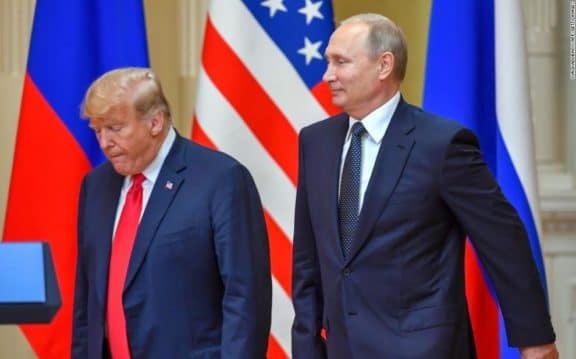Russian President Vladimir Putin with Donald Trump, Helsinki, July 16, 2018
UPDATE, 0825 GMT:
The Associated Press reports that, as Donald Trump used a tweet to absolve Moscow of responsibility, White House officials were told to cancel a statement citing Russia as “the main actor” in cyberattacks.
“A US official familiar with the conversations” confirmed the last-minute cancellation on Friday afternoon.
ORIGINAL ENTRY: Secretary of State Mike Pompeo, reflecting the views of US intelligence, declares that “we can say pretty clearly that it was the Russians” behind the widespread hacking of US Government agencies and corporations.
But hours later, Donald Trump tweets that the “Cyber Hack” is a creation of the “Fake News Media”, maintains that China might be the culprit, and links the issue to his fraudulent claims of a rigged election.
From the spring, hackers targeted at least six Government agencies, including the Pentagon; Departments of Homeland Security, Treasury, Energy, and Commerce; the National Nuclear Security Administration; and the Los Alamos Nuclear Laboratory. They also attacked more than 40 corporate entities, including leading telecommunications firms, and gained access to more than 18,000.
Officials discovered the attacks this autumn and issued an alert on Thursday about “a grave risk to the Federal Government”. Intelligence agencies told Congress that they believe the Russian intelligence service SVR is behind the hacking.
See also “Grave Risk”: More Hacking Attacks on US Government; Russia Suspected
Pompeo summarized the assessment in an appearance on a radio program, “This was a very significant effort….We’re still unpacking precisely what it is.” He said that most details are likely to remain classified.
But Trump blasted on Twitter, tagging Pompeo and Director of National Intellligence John Ratcliffe:
….discussing the possibility that it may be China (it may!). There could also have been a hit on our ridiculous voting machines during the election, which is now obvious that I won big, making it an even more corrupted embarrassment for the USA. @DNI_Ratcliffe @SecPompeo
— Donald J. Trump (@realDonaldTrump) December 19, 2020
The tweet echoed the loud declaration of Russian officials and their social media supporters that there is no evidence pointing to Moscow’s responsibility.
It also recalled Trump’s denial of Russian hacking during his 2016 Presidential campaign, when he contradicted US intelligence findings to claim China or a “400 pound [person] sitting on his bed” was responsible and not Moscow.
Russian officials gave the stolen information, seeking to damage Democratic nominee Hillary Clinton, to WikiLeaks for publication. Trump’s long-time political operative Roger Stone liaised with WikiLeaks during the operation.
Two years later, as the Justice Department indicted 12 Russian intelligence officers, Trump used a summit to declare that he chose the denials of Russian President Vladimir Putin over the findings of US intelligence servies.
“Never has there been a President work so hard to provide cover for Russia,” said Clint Watts, a former FBI special agent and Russian information warfare expert at the Foreign Policy Research Institute.
US Response “A Total Disaster”
“People familiar” with Trump’s private statements said he is calling the hacks a “hoax” and pressed his advisors associates to downplay its significance and absolve Russia by giving alternative culprits.
Larry Kudlow, Trump’s chief economic adviser, accordingly told reporters on Friday, “People are saying Russia. I don’t know that. It could be other countries.”
The Trump Administration’s national security officials said that they are almost certain that they will have to hand off the matter, and a US response, to the incoming Biden Administration.
President-elect Biden said Thursday, “A good defense isn’t enough.” He said he would impose “substantial costs on those responsible for such malicious attacks”.
His close associate Sen. Chris Coons added, “We have failed to deter the Russians. We are only going to see Putin stop this action when we stop him.”
Trump has overseen the elimination of the White House Cybersecurity Coordinator, despite warnings of US vulnerability. His officials only learned of the hack from cybersecurity company FireEye, a cybersecurity company, after it was breached. They have asked Microsoft rather than Government agencies to assess the extent of the Russian breach.
Dmitri Alperovitch, a co-founder of security firm CrowdStrike, summarized:
The response has been a total disaster, not just because of the president, but because whoever is left is just polishing up their resumes. There’s no coordination and every agency is just doing whatever they can to help themselves.
Microsoft’s Brad Smith said of the Russian operations, “This was a cybersecurity superspreading event…a moment of reckoning.”
And Stephen Boyer, an executive at cybersecurity firm BitSight, explained, “They [the attackers] had unfettered access for nine months. We may never know what we lost.”

